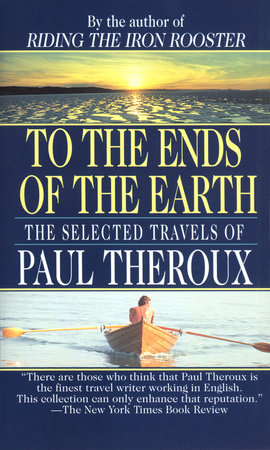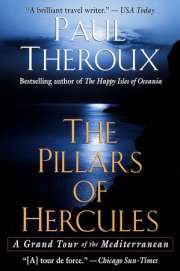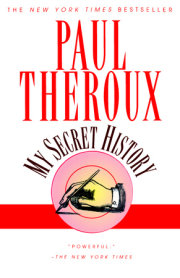Introduction
I HAD BEEN TRAVELING FOR MORE THAN TEN YEARS—IN EUROPE, Asia, and Africa—and it had not occurred to me to write a travel book. I had always somewhat disliked travel books: they seemed self-indulgent, unfunny, and rather selective. I had the idea that the travel writer left a great deal out of his or her book and put all the wrong things in. I hated sight-seeing, and yet that was what constituted much of the travel writer’s material: the pyramids, the Taj Mahal, the Vatican, the paintings here, the mosaics there. In an age of mass tourism, everyone set off to see the same things, and that was what travel writing seemed to be about. I am speaking of the 1960s and early 1970s.
The travel book was a bore. A bore wrote it and a bore read it—I could just imagine the sort of finger-wetting spud in carpet slippers who used his library card as bookmark, and called himself an armchair traveler. As for the writer, it annoyed me that a traveler would suppress his or her moments of desperation or fear or lust. Or the time he or she screamed at a taxi driver, or was picked up by a plausible local, or slept until noon. And what did they eat, what books did they read to kill time, and what were the toilets like? I had done enough traveling to know that half of travel was delay or nuisance—buses breaking down and hotel clerks being rude and market traders being rapacious. The truth of travel was unexpected and off-key, and few people ever wrote about it.
Now and then one would find this reality in a book—Evelyn Waugh being mistaken for his brother Alec in Labels, or the good intentions and bad temper in parts of Naipaul’s An Area of Darkness, a superbly structured book, deeply personal and imaginative and informative, but wayward, too. I saw it in the humor and the dialogue in Trollope’s The West Indies and the Spanish Main.
An unlikely source, Nabokov’s Laughter in the Dark, vividly illustrates this sort of travel writing. One of the characters says, “A writer for instance talks about India which I have seen, and gushes about dancing girls, tiger hunts, fakirs, betel nuts, serpents: the Glamour of the Mysterious East. But what does it amount to? Nothing. Instead of visualizing India I merely get a bad toothache from all these Eastern delights. Now, there’s the other way, as for instance, the fellow who writes: ‘Before turning in, I put out my wet boots to dry and in the morning I found that a thick blue forest had grown on them (“Fungi, Madam,” he explained) …’ and at once India becomes alive for me. The rest is shop.”
When something human is recorded, good travel writing happens.
The trip—the itinerary—was another essential; and so many travel books I read had grown out of a traveler’s chasing around a city or a little country—Discovering Portugal, that kind of thing. It was not travel at all, but rather a form of extended residence that I knew well from having myself lived in Malawi and Uganda and Singapore and England. I had come to rest in those places, I was working, I had a local driver’s license, I went shopping every Saturday. It had never occurred to me to write a travel book about any of it. Travel had to do with movement and truth, with trying everything, offering yourself to experience and then reporting it. And I felt that television had put the sightseers out of business.
Choosing the right itinerary—the best route, the correct mode of travel—was the surest way, I felt, of gaining experience. It had to be total immersion, a long deliberate trip through the hinterland rather than flying from one big city to another, which didn’t seem to me to be travel at all. The travel books I liked were oddities—not simply Trollope and Naipaul but Henry Miller’s The Air-Conditioned Nightmare (America, coast to coast, by car), or Mark Twain’s Following the Equator (a lecture tour around the world). I wanted my book to be a series of long train journeys, but where to?
All this speculation took place in the autumn of 1972, when I was teaching for a semester at the University of Virginia. I was working on a novel, The Black House, and awaiting the publication of Saint Jack. In those days I began a new book as soon as I finished the one I was working on. My wife, Anne, was in London with our two children, and she was working—indeed, earning a good living—but I still felt I was the breadwinner and that I was not earning enough. My British advance for Saint Jack came to about $500, and I assumed I would not get much more for The Black House. I kept thinking to myself, Now what?
Money is rather a clumsy subject, but it was a crucial factor in my decision to write my first travel book—simply, I needed the money. And when I mentioned the possibility of such a book to my American editor, she was delighted. She said, “We’ll give you an advance for it.” I had never before received an advance at this stage. Normally, I wrote a book and submitted it and then was paid; I had never asked for, nor been given, money or a contract on an unwritten book.
It is often the case that only when someone asks you very specific questions do you begin to think clearly about your intentions. In my mind this travel book had something to do with trains, but I had no idea where I wanted to go—only that it should be a long trip. I saw a thick book with lots of people in it and lots of dialogue and no sightseeing. But my editor’s questioning made me think hard about it, and I thought, Trains Through Asia. I was determined to start in London, and to take the Orient Express, and when I looked at this route, I saw that I could continue through Turkey, into Iran, and after a short bus ride in Baluchistan, I could catch a train in Zahedan, go into Pakistan, and more or less chug through Asia.
My original idea had been to go to Vietnam, take the train to Hanoi, and then continue through China, Mongolia, and the Soviet Union. Much of this, on closer examination, proved impractical or impossible. The man at the Chinese Embassy in 1972 abruptly hung up on me when I said I wanted a visa to take trains through China. I had to wait fourteen years before I was able to take the trip I described in Riding the Iron Rooster. Then I discovered there was a war in progress in Baluchistan. I rerouted myself through Afghanistan. I decided to include Japan and the whole of the Trans-Siberian. I didn’t mind where I went as long as it was in Asia and had a railway system and visas were available. I saw myself puffing along, changing countries by changing trains.
Meanwhile, I was finishing my novel The Black House. It was set in rural England and it was rather ghostly and solemn. I wanted my next to be a sunny book. I had just about decided on my travel itinerary when I delivered my novel to my British publisher. He suggested we have lunch. Almost before we had started eating he told me how much he disliked The Black House. “It will hurt your reputation” was how he put it. “But I want to publish your travel book.” I had told him that I had signed a contract for this with my American publisher. I said that if he brought out my novel he could have the travel book. “If you twist my arm I’ll publish your novel,” he said. That did it. It made me want to leave him immediately.
For dropping me from his list—after all, what was I costing him?—he became rather a laughingstock. But that was later. I think of the circumstances surrounding my first travel book, The Great Railway Bazaar, rather than the trip itself. I hated leaving my family behind in London, I had never taken such a deliberate trip before, I felt encumbered by an advance on royalties, modest though it was; and my writer friends, stick-in-the-mud English writers, generally mocked my idea. I never got around to worrying about the trip itself, though I was beset by an obscure ache that was both mental and physical—the lingering anxiety that I was doomed: I was going to die on this trip.
I had always had the idea and still do that my particular exit would be made via an appointment in Samarra: I would go a great distance and endure enormous discomfort and expense in order to meet my death. If I chose to sit at home and eat and drink in the bosom of my family, it would never happen—I’d live to be a hundred. But of course I would head for the hinterland, and pretty soon there would be some corner of a foreign field that would be forever Medford, Mass. And I imagined my death would be a silly mistake, like that of the monk and mystic Thomas Merton, who at last left his monastery in Kentucky after twenty-five secure years, and popped up in Singapore (while I was there), and accidentally electrocuted himself on the frayed wires of a fan in Bangkok a week later. All that way, all that trouble, just to yank a faulty light switch in a crummy hotel!
Copyright © 2011 by Paul Theroux. All rights reserved. No part of this excerpt may be reproduced or reprinted without permission in writing from the publisher.







